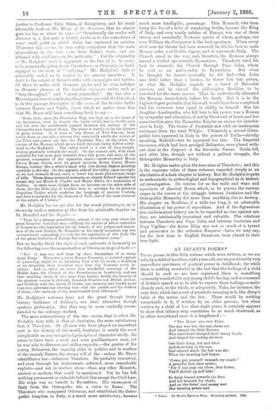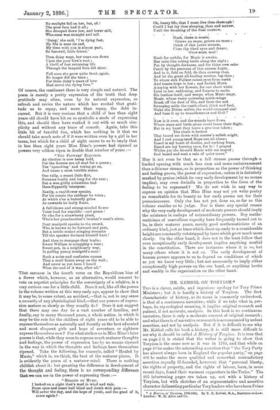AN INFANT'S POEMS.*
MOSE poems in this little volume which were written, as we are told, by a child of less than eight years old, are unquestionably very marvellous specimens of poetical power in childhood ; for -while there is nothing wonderful in the fact that the feelings of a child should be such as are here expressed, there is something extremely wonderful in any young child's having such a command of distinct speech as to be able to express these feelings so melo- diously and, on the whole, so adequately. Take, for instance, the very first, which has a sort of parabolic meaning in it, like ZEsop's fable of the mouse and the lion. There would be nothing remarkable in it, if written by an older person ; but when written by a child of less than eight years, it certainly appears to show that infancy may sometimes be as much shortened, as in other exceptional cases it is lengthened :— " THE DAISY AND THE FERN.
The day was hot, the sun shone out And burned the little flowers, Who earthward drooped their weary heads And longed for cooling showers.
One little daisy, hot and tired And scorching in the sun, Had altered much, for fair was she When the morning had began.
'Come, put yourself beneath my shade!' A graceful fern thus spoke; 'For if you stay out there, dear flower. You'lla3hrivel up and bake.'
So daisy leaned towards the fern And hid beneath her shade, And on the ferns' cool mosey root Her burning petals laid.
• Poems. By Maude Egerton Hine. Privately printed. 1885.
No sunlight fell on her, but, oh ! The poor fern had.it all ; She drooped down low, and lower still, Who-ones was straight and tall.
'Daisy,' she said, 'I'm dying fast, My life is near its end, My time with you is almost past, So farewell, little friend.'
Than daisy wept, her tears.ran down Upon the poor fern's root ; A thrill of fast returning life Through the languid fern did shoot.
Fell soon she grew quite fresh again, No longer did she burn ; For little daisy's tears of love Had saved the dying fern."
Of course, the sentiment there is very simple and natural. The poem is merely a pretty expression of the truth that deep gratitude may often, even by its natural expression, so refresh and revive the nature which has excited that grati- tude as to repay, and more than repay, the debt in- curred. But it is very curious that a child of less than eight years old should have hit on so symbolic a mode of expressing this, and should then have worked it out with so much sim- plicity and without any trace of conceit. Again, take this little bit of fanciful fun, which has nothing in it that we should take much note of if it were written even by a girl in her teens, but which for a child of eight seems to us to imply that in less than eight years Miss Hine's powers had ripened as powers very seldom ripen in double that number of years :—
"THE FLOWERS' ELECTION.
An election is now being held, For-the flowers are all mad for a queen ; The speeching ' and, voting go on, And cause a most terrible scene.
One tulip, a smart little flirt, Screams loudly and long for the rose ; But a wee giddy columbine bud Doesiflippantly interpose.
Nextly, a cauliflower speaks, For his cousin the cabbage he votes ; At which e'en a butterfly grins As -onwards he lazily floats.
A fall-blown and strong-minded flower Votes loud for republic—and peace !
Or else.for a strawberry plant, Who's her grandmother's brother's aunt's niece.
Next marigold speaks to the crowd, Who is known to be forward and pert, But a nettle makes stinging remarks Till the speaker declares himself hurt !
And then to rampage they begin ; Sweet William is scragging a rose ; Sweet-pea, in a neighbourly way, Is pulling young marigold's nose !
Such a noise-and confusion ensues That a snail faints away on the wall ; And never as yet have I heard What the end of it was, after all."
Tliafi sarcasm in the fourth verse on the Republican bias of a flower which, however, as an alternative, would consent to vote on nepotist principles for the sovereignty of a relative, is a very curious one for a little child. Does it not, like all the poems in the volume written at this very early age, appear to show that it may be, to some extent, an accident, —that is, not in any sense a necessity of any physiological kind,—that our powers of expres- sion mature so slowly as they usually do ? Does it not suggest that there may one day be a vast number of families, and finally, say in many thousand years, a whole nation, in which it may be the rule for the children of eight years old-to be able to express themselves as naturally and fluently as the best educated and most eloquent girls and boys of seventeen or eighteen express themselves now P For what strikes us in Miss Hine's later poems is that, while they seem to express much maturer thoughts and feelings, the power of expression has by no means ripened in the way in which the-thoughts and feelings have themselves ripened. Take the following, for example, called "Healed by Mnsio," which is, we think, the best of the maturer pieces. It is evidently the poem of a maturer mind. There is nothing childish about it ; but granting the difference in development of the- thought and feeling, there is no corresponding difference thairwe-ean see,in the power of expressing them :—
"HEALED BY MUSIC.
I looked:on a night that's mad in wind and rain, From eyes and heart half blind and dumb with pain :-
Will never the day, and the hope of youth, and the good of it, come again ? Oh,.heavy life, that. I must. live thee thorough! Could I but lay thee sleeping. thou and. sorrow, Until the breaking of the final morrow.
Hash, there is mnsio.
Grieve no more, grieve no-more; Drink of this Lathe stream, Close thy tired eyes and dream, Over.worn soul !
Hush for awhile, for Music is awake, Her mist-like robing trails along the night; Pat by thought-darkness, and for thine owe sake Catch by the garment of this unseen Light, And in it, fold on fold, do thou enwrap thee, And let the great all-healing mother, lap thee ; To whom sick Failure raises eyes-from earth And traces hope in her ; and foolish Midi* A-toying with her flowers; for one short while Lists to her, saddening, and forgets to smile. Sin loathes itself, and weeps, when Music sings, Music, whose vasty quivering spirit-wings Brash off the dust of life, and from the sod. Sweeping aside the earth-cloud, thick and foul, Wake the Divine within the world-cramped soul And bear it up to boundlessness-and God.!'
..... . . . .
Now is-it over, and the sounds have flown- Where stars and birds alone could trace their flight, But in my heart they leave a gracious token ; The chain is broken That bound me down with sorrow's selfish might, And I and young-eyed. Hope are all alone; Eased is my heart of doubts, and carking fears, Eased are my burning eyes, for lo ! I prayed Whiles yet the blessed Music with me stayed ; God heard and sent a rain of quiet tears."
May it not even be that as a full stream passes through-.a limited opening with much less ease and more embarrassment than a thinner stream, so in proportion as the power of thinking and feeling grows, the power of expression, unless-it is definitely marked by genius (which its very early development by no means implies), may even dwindle in proportion to the force of the feeling to be expressed? We do not wish in any way to express an opinion that Miss Hine may not yet write poetry as remarkable-for its beauty as her early poems are for their precociousness. Only she has not yet done so, so far as this volume enables us to judge. Nor is there any special reason why the very early development of moderate powers should imply the existence in embryo of extraordinary powers. Boy mathe- maticians of marvellous capacity have frequently turned out to be, in their maturer years, merely good mathematicians of an ordinary kind, just as trees which shoot up early to a considerable height are-constantly outstripped by trees which grow much more slowly. On the other hand, it does not in the least follow that even exceptionally early development implies anything morbid in the constitution. There are instances where it is so, but many others where it is not so. The early development of human powers appears to us to depend on conditions of which as yet we know very little ; but not necessarily to imply either exceptionally high powers on the one hand, or anything hectic and weakly in the organisation on the other hand.











































 Previous page
Previous page